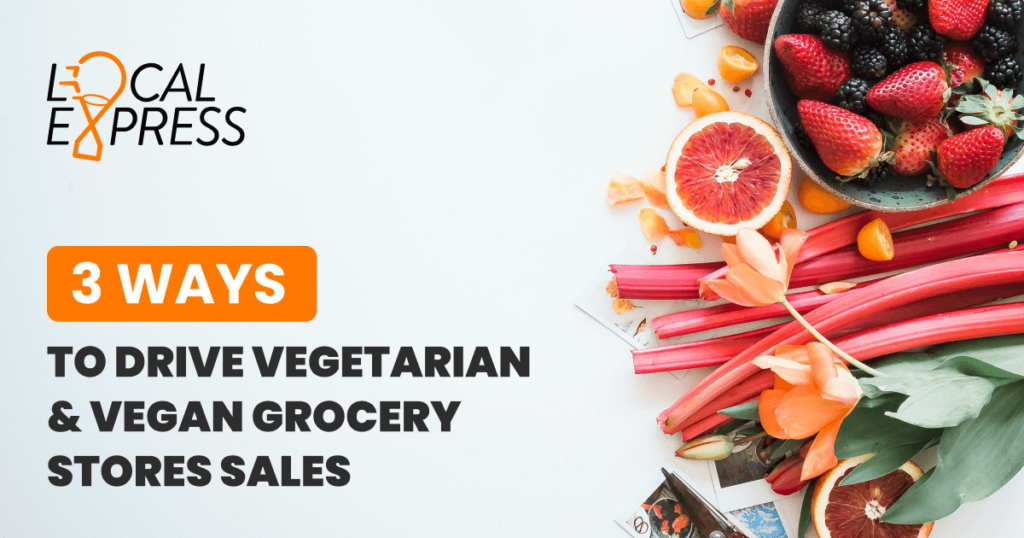
Just a few years ago, being vegetarian or having a vegetarian (let alone vegan!) friend meant endless scanning of restaurant menus before every night out to see if there was at least one meatless option, or making substantial changes to BBQ dinner plans. A lot has changed since Whether it’s for health reasons, climate change, or animal welfare, the ranks of people that favor a plant-based diet are expanding rapidly – and vegetarian grocery store sales stand to benefit.
At the beginning of 2020, the size of the US plant-based foods market was estimated at $5 billion. Even if not sticking to a strictly vegan or vegetarian diet, consumers are changing their eating habits due to increased awareness and new innovative food alternatives entering the market.
With many exciting opportunities to reap, what can vegan and vegetarian grocery stores do to drive more sales?
1. Make the Process Easy
When promoting plant-based grocery offerings, it’s all about making the shopping experience as convenient as possible. Traditionally, consumers saw vegetarian and vegan products as less accessible and more expensive than meat-based products, so working to change that perspective is key to both maintaining loyal customers and attracting new ones.
With shopping moving to the digital realm, it’ll pay to also focus on optimizing your SEO strategy and providing a smooth browsing experience on your platform. Then, making delivery a part of the experience is key: When streamlined and flexible (with easy delivery time scheduling), grocers can progress by leaps and bounds to break down the barriers to a more healthy lifestyle.
In a similar sense, out-of-stock situations should be avoided as much as possible, so grocers should always keep a close eye on their real-time inventory. And should it happen still, make sure to offer a solution or identify an immediate alternative. After all, those with a specific vegetarian meal plan and grocery list want to get exactly what they’re looking for.
Optimize your offerings for convenience as well: Grocers can pre-package, precut, and pre-wash vegetables and offer different dips and salsas (such as hummus). Meal kits, on the other hand, can help those who are only getting started with vegetarian or vegan cooking. Likewise, coming up with colorful fruit or vegetable party trays could be a nice addition to the mix, as at-home consumption has grown with the pandemic. From a diverse nut selection to pastries and onion dips, there’s a lot to experiment with!
2. Tailor Winning Promotions
Interestingly, it’s believed that offering a discount code for vegan options specifically can work even better than with meat-based products. This is because the plant-based food community is often very tightly-knit and its members enjoy sharing updates with others. Sharing the promotions can also have an advocacy aspect: They can be used to encourage friends to try vegan food for the first time or prove that even such food can be attractive and accessible.
This particular characteristic of the vegetarian and vegan community should always be kept in mind: Studies suggest that the most common reason for giving up meat is animal welfare. With environmental impact also ranking high, grocers can tailor their promotions or organize events in order to support a specific cause, from fighting deforestation to supporting wildlife conservation efforts.
Other than that, the way promotions (and offerings altogether) are presented is also fundamental. The language used to describe plant-based foods may work both to enhance and suppress appetites. For example, “meat-free” and “fake meat” are often offputting for vegetarians and vegans, while “veggie” or “plant-based” performed best. This is because talking about what is missing limits the brain’s ability to positively imagine how it could taste.
3. Accompany Shoppers on Their Vegetarian/Vegan Journey
As adopting a plant-based diet isn’t the norm for the majority of people, many are looking for guidance on their journey. Educating consumers on different products or items, together with sharing recipes or weekly meal plan ideas works great.
Vegetarian and vegan grocers can also leverage online content. Whether it’s creating a blog series or simple how-to videos, such strategies can help build an entire community around a local store and boost customer loyalty. For example, try sharing a simple vegetarian grocery list for weight loss, muscle building, or a stronger immune system. By tapping into current store promotions, this content can even generate more noise around relevant ingredients (such as nutritional yeast, tofu, or tempeh) that are perhaps less known to many shoppers.
This can have an in-store aspect as well: By organizing workshops, video series, or sampling events, grocers can generate more in-store traffic while adding another incentive for purchase. To give extra value, any tips you share can also revolve around an environmentally friendly lifestyle, including recycling, food scraps use, and at-home DIYs.
With the plant-based diet becoming more popular than ever, vegan and vegetarian grocery store sales have the potential to boom – especially when leveraging a seamless shopping experience, relevant promotions, and valuable content.
To learn more tips for restaurants and local grocers from Local Express, explore our blog!






